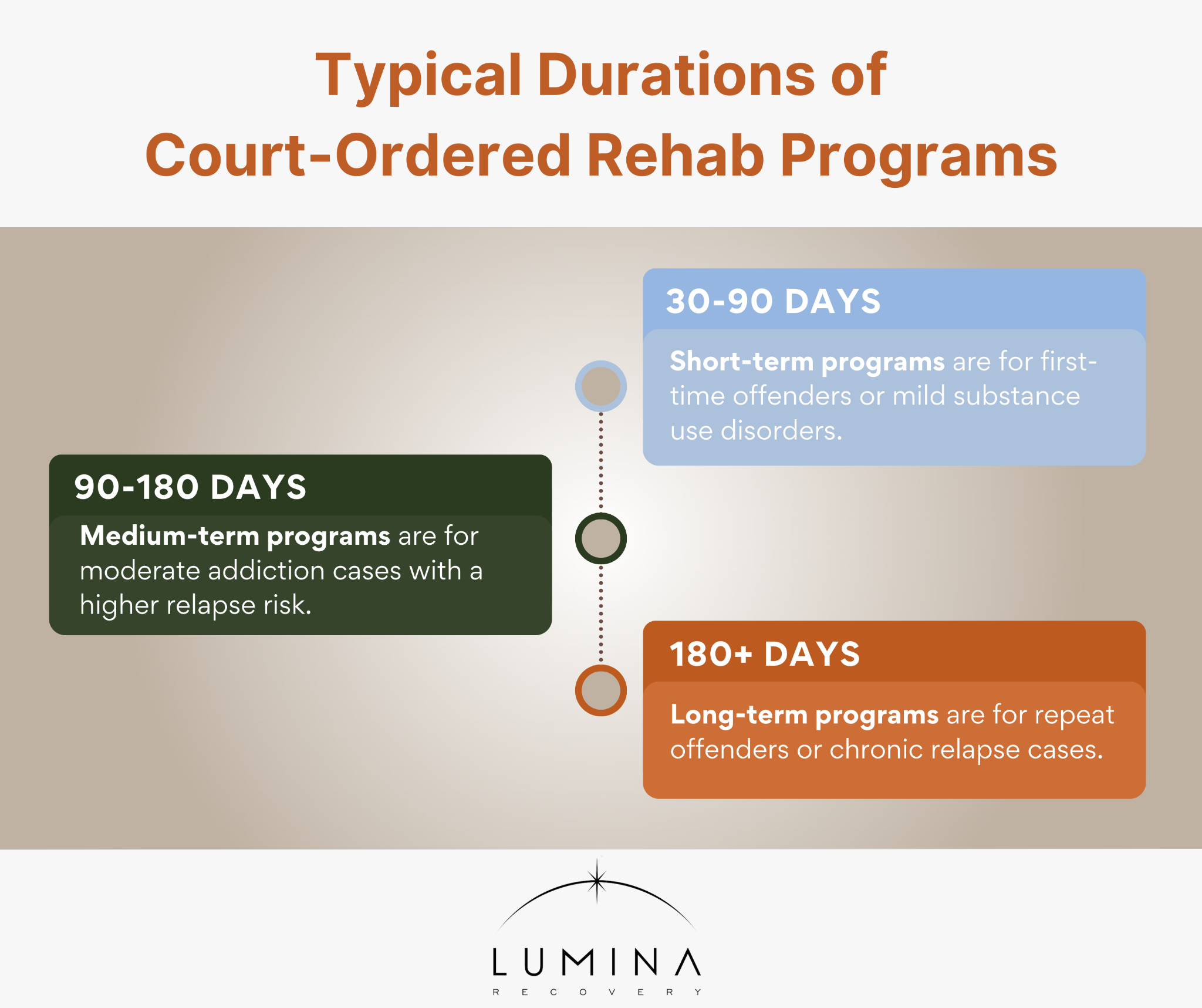The length of court-ordered rehab depends on multiple factors, including the severity of addiction, legal requirements, and individual progress. While some programs last only 30 days, others may extend for several months or even a year.
The primary goal of court-ordered rehab is to provide individuals with the necessary treatment to overcome substance use while fulfilling legal obligations. By choosing rehabilitation over incarceration, courts aim to reduce recidivism and promote long-term recovery.
What Is Court-Ordered Rehab?
Court-ordered rehab is a treatment program mandated by a judge as part of a criminal sentencing agreement. The objective is to address substance use disorders (SUDs) through structured interventions rather than punitive measures. These programs aim to rehabilitate individuals, helping them reintegrate into society while lowering the likelihood of future offenses.
Laws governing court-ordered rehab vary by jurisdiction, but most are based on the principle of rehabilitation over incarceration. Some states have alternative sentencing programs, allowing non-violent offenders to choose treatment instead of jail.
Factors Influencing the Duration of Court-Ordered Rehab
The length of court-ordered rehab is not fixed and can vary widely depending on several critical factors. Knowing these elements can provide insight into how long an individual may be required to stay in treatment.
Severity of the Offense
More serious offenses, such as those involving repeat DUI violations or drug-related felonies, often require longer treatment durations. Milder infractions, like first-time possession charges, may result in shorter rehab programs.
Individual Assessment and Progress
Treatment duration is often tailored to an individual’s needs. Progress evaluations determine whether an offender requires additional time in rehab. Compliance, engagement, and response to therapy play key roles in determining the overall stay.
Type of Substance Abuse
Different substances have different withdrawal timelines and treatment needs. For example, opioid or methamphetamine addiction may require extended treatment compared to marijuana or alcohol addiction.
Compliance With Program Requirements
Failure to meet program expectations, such as missing therapy sessions or relapsing, can result in extended rehab durations or legal consequences. Successful participation often leads to earlier program completion and legal benefits.

Typical Durations of Court-Ordered Rehab Programs
The length of court-ordered rehab varies depending on the severity of the addiction, legal requirements, and individual progress. Understanding the length of rehab treatment programs can help individuals and their families prepare for the commitment involved.
- 30-90 Days: Short-term programs focus on detoxification, education, and basic counseling. They are often used for first-time offenders or those with mild substance use disorders. These programs provide a foundation for continued outpatient or aftercare support.
- 90-180 Days: Medium-term programs provide more intensive therapy, including behavioral counseling, skill-building, and group therapy. They are suited for moderate addiction cases where relapse risk is higher. Participants engage in structured routines that reinforce recovery strategies.
- 180+ Days: Long-term rehab is reserved for individuals with severe addiction or co-occurring mental health disorders. These programs often include comprehensive therapy, life-skills training, and more to support lasting recovery. Courts may mandate these longer programs for repeat offenders or those with histories of chronic relapse.
Benefits of Completing Court-Ordered Rehab
Successfully completing court-ordered rehab provides numerous advantages, both legally and personally. By fulfilling the requirements of the program, individuals can improve their future prospects and enhance their overall well-being.
1. Avoiding a Criminal Record
Completion of court-ordered rehab can prevent a permanent criminal record, which can impact future job opportunities, housing applications, and other aspects of life. This can help individuals rebuild their lives without the burden of a conviction limiting their options.
2. Developing Healthy Coping Mechanisms
Rehabilitation programs equip individuals with essential tools to manage stress, triggers, and cravings, reducing the likelihood of relapse. By learning emotional regulation techniques and healthier responses to challenges, participants gain valuable life skills that promote long-term sobriety.
3. Strengthening Relationships
Addiction can strain personal relationships. Rehab provides opportunities for family therapy and rebuilding trust with loved ones. Restoring these relationships can create a strong support system that fosters ongoing recovery and emotional stability.
4. Access to Continued Support and Resources
Many programs offer aftercare services such as support groups, outpatient therapy, and peer mentorship, ensuring long-term recovery success. These resources help individuals stay connected to a recovery community, reinforcing accountability and continued progress toward sobriety.

FAQs
How long is court-ordered rehab?
Court-ordered rehab can last anywhere from 30 days to over a year, depending on the individual’s circumstances and the court’s ruling. The type of program and personal progress also affect the duration.
What factors determine the length of a court-ordered rehab program?
The severity of the offense, individual progress, type of substance abuse, and compliance with program rules all impact the duration of treatment.
Can completing court-ordered rehab lead to legal benefits?
Yes, successful completion can lead to reduced charges, shorter probation periods, and even record expungement in some cases. Judges may offer alternative sentencing options that emphasize treatment over punishment.
What happens if a person fails to complete their court-ordered rehab?
Failure to comply with rehab requirements can result in legal consequences, including jail time, fines, or extended probation. Courts may impose stricter penalties on individuals who do not follow the guidelines of their alternative sentencing program.
Are there different types of rehab programs available under court orders?
Yes, court-ordered rehab may include inpatient treatment, outpatient care, detox programs, and specialized therapy options tailored to individual needs. Courts consider various factors when determining the best program for each individual.
Start Rehab Today With Lumina Recovery
Court-ordered rehab offers individuals struggling with addiction an opportunity to seek meaningful change instead of facing incarceration. Treatment lengths vary based on legal and personal factors, but all programs emphasize recovery and rehabilitation.
At Lumina Recovery, we offer a full range of treatment options, including specialized programs and dual diagnosis treatment, to support individuals at every stage of recovery.
If you or a loved one needs guidance on court-ordered rehab, contact us today to explore treatment options and start the path to recovery.


